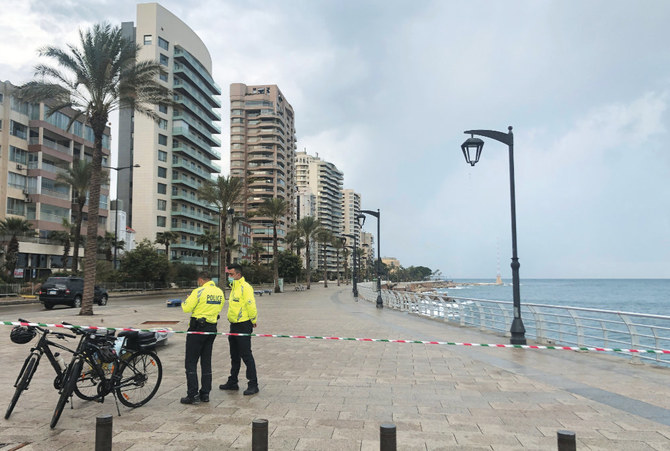
by NAJIA HOUSSARI — arabnews.com — BEIRUT: Lebanon’s security forces have praised public compliance with lockdown measures as the country struggles to reduce a dramatic rise in the number of coronavirus cases. Internal Security Forces spokesman Col. Joseph Mousallem told Arab News that the rate of commitment to the curfew was 90 percent across the country, including poorer districts, where residents previously have been skeptical about measures to stop the spread of the virus. However, with 10 days until the nationwide lockdown ends, a record 5,000 confirmed coronavirus cases were reported on Wednesday. A 19-year-old man was among the 35 deaths. Director of the Hariri Governmental University Hospital, Dr. Firas Al-Abyad, renewed his warning that “the situation is very serious, and we need to work together to end these difficult circumstances.”
Lebanon’s healthcare sector is exhausted after 10 months of dealing with the pandemic, he said. “We need to find an exit from this situation.” Most hospitals in Lebanon have canceled all but emergency operations amid warnings of bed shortages and medicines running low. Beirut and other major cities have been largely silent in recent days, with traffic limited to grocery deliveries and vehicles exempted from the curfew. Observers say that a media campaign urging people to stay home by highlighting the suffering of patients and those unable to find a hospital bed appears to have convinced most Lebanese to adhere to the latest restrictions. However, Dr. George Jovelekian, head of the intensive care department at St. George Hospital University Medical Center, said that the country still faces “two catastrophic weeks in terms of coronavirus cases.” He called on people to follow the restrictions so that medical staff can continue to perform their duties.
Mousallem said that security checkpoints have been set up in all regions in coordination with the Lebanese army. Security personnel also have been placed at army checkpoints to ensure people comply with the measures. Meanwhile, a directive that people make requests to leave their house via a dedicated website has led to widespread confusion amid complaints that the platform had crashed. “The permits are electronic, so mistakes are inevitable,” Mousallem said. “However, anyone who wants to leave their house after having their requests approved must present the required documents to the security checkpoints.”
Those violating the curfew could face detention for three months, in addition to fines of up to 600,000 Lebanese pounds ($500). Hamad Hassan, the caretaker health minister, is being treated in hospital after it was confirmed he had coronavirus. Three people in his office also have been infected. Security forces in Halba in northern Lebanon said that a large number of Syrian refugees had failed to comply with the safety measures by going to a bank to withdraw money from an ATM. The United Nations Relief and Works Agency for Palestine Refugees (UNRWA) later called on refugees to comply with the full lockdown and other preventive measures.
The agency said that there had been 3,991 coronavirus cases among Palestinian refugees since February 2020, with 145 deaths. It warned that Lebanon’s hospitals are reaching maximum capacity and accommodating patients in intensive care units is becoming more difficult. The civil emergency authority in Lebanon, Lebanon SOS, complained that relief organizations have been included in the curfew, threatening the distribution of food to needy families.



